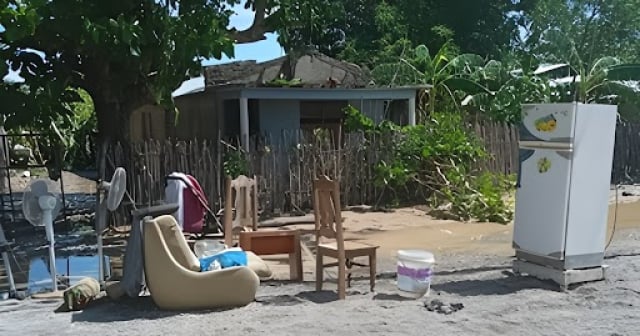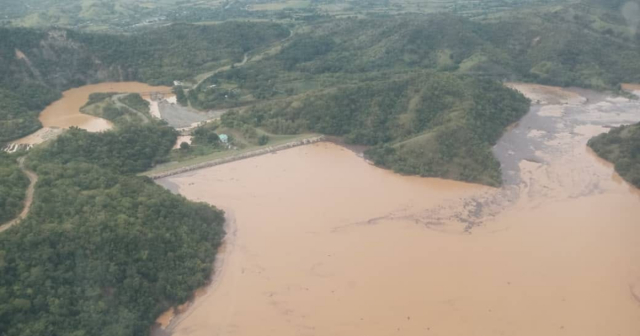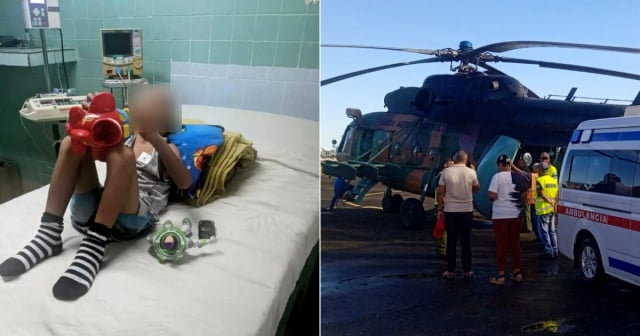Hurricane Oscar has left a trail of destruction in the eastern region of Cuba, particularly in the province of Guantánamo, where heavy rains and rising rivers have caused one of the worst humanitarian crises in recent times.
The passage of Hurricane Oscar: a devastating phenomenon
Hurricane Oscar made landfall on the eastern coast of Cuba on October 20, 2024, becoming a storm of significant impact for the province of Guantánamo. During its passage, the cyclone brought torrential rains that, in just 24 hours, resulted in accumulations of over 500 millimeters in several locations. These intense rains triggered massive flooding, especially in municipalities such as San Antonio del Sur, Imías, Baracoa, and other surrounding towns.
The rising rivers, including the Sabanalamar and Los Ciguatos, have caused large areas of the region to become flooded, with water reaching heights of up to one meter in some places. This situation has left hundreds of families homeless, and many have lost all their belongings.
Displacement of families and humanitarian situation
The impact of the hurricane has created a humanitarian crisis in Guantánamo. Thousands of people were evacuated from their homes and sheltered in evacuation centers, while others took refuge in the homes of family and friends. However, the amount of water and landslides have left some communities cut off, making it difficult to deliver humanitarian aid.
The Cuban government has confirmed the deaths of at least seven people due to flooding and landslides, although some accounts from locals and activists suggest that the number of victims may be higher. Several testimonies mention missing persons, families that have not been located, and the collapse of bridges that hindered access to the most affected areas.
Impact in San Antonio del Sur and Imías: the hardest-hit areas
San Antonio del Sur: chaos and destruction
San Antonio del Sur has been one of the municipalities most affected by Hurricane Oscar. The torrential rains and the rapid overflow of rivers caught many residents by surprise, and without access to adequate information due to power outages, they were unable to evacuate in time. In some areas, the force of the current swept away people and homes, and there were reports of drowning fatalities.
The panic situation intensified when rumors about a possible breach of the local dam spread, leading many people to desperately leave their homes in search of shelter. Local authorities denied these rumors, labeling them as "fake news," but the alarm had already created a state of chaos among the population.
Imías: landslides and isolation
Imías, another municipality severely impacted, experienced landslides that buried several homes, and access roads were destroyed. The communities were isolated for several days, complicating rescue and assistance efforts. Images shared on social media show houses completely covered in mud and collapsed bridges that hindered land transit.
Information and chaos caused by a supposed open dam
Amid the crisis, rumors circulated about the breaking of the San Antonio del Sur dam, causing panic and confusion among the residents of the municipality. This false information led many residents to hastily leave their homes, fearing that an imminent overflow could worsen the flooding.
The authorities quickly denied these rumors, stating that the dam had not suffered structural damage and that the news circulating on social media aimed to destabilize the population during a critical time. However, fear and misinformation had already spread, exacerbating the emergency situation in San Antonio del Sur.
The unleashed panic led to many people, including the elderly and children, being evacuated chaotically. Some testimonies describe how entire families fled to the mountains, carrying their loved ones amid the confusion. The lack of an effective communication system during the massive blackouts was also a contributing factor to the chaos, leaving many individuals without access to reliable information during times of great uncertainty.
Lack of preparation and response from the government.
The Cuban government's management of the crisis has faced sharp criticism. Many residents have reported that there was inadequate preparation for the arrival of the hurricane, and that the lack of early warning systems and ineffective communication worsened the situation. The island was in the midst of a massive blackout that left many families without access to weather information, limiting their ability to respond to the emergency.
Local authorities have emphasized the evacuation efforts and the mobilization of resources, with over 15,000 people evacuated in San Antonio del Sur and Imías. However, residents question the slowness of the response and the lack of effective preventive measures.
The role of the military and humanitarian aid
The Cuban Army has played a central role in rescue and assistance efforts, utilizing helicopters to evacuate vulnerable individuals, such as pregnant women and critically ill patients, from the most affected areas. However, the distribution of food and medicines has been limited by a lack of resources and difficult access to certain regions.
In parallel, several groups of activists have launched aid initiatives from abroad and from other provinces of the country. These private initiatives have been crucial in providing basic supplies to communities, such as drinking water, food, medicine, and other essential products.
Future Prospects: The Challenge of Reconstruction
The recovery phase in Guantánamo will be prolonged and complicated, especially in the context of the economic crisis affecting the country. The destruction of infrastructure, the loss of crops, and the precarious living conditions present enormous challenges for families who have lost their homes and sources of income.
Health risks following the floods
Health authorities have warned about the risk of diseases following the floods, particularly due to the accumulation of standing water that could promote mosquito proliferation. Francisco Durán, the national director of Epidemiology at Cuba's Ministry of Public Health, has urged the population to boil water and use chlorine tablets to prevent diarrheal and respiratory illnesses.
What do you think?
COMMENTFiled under:






